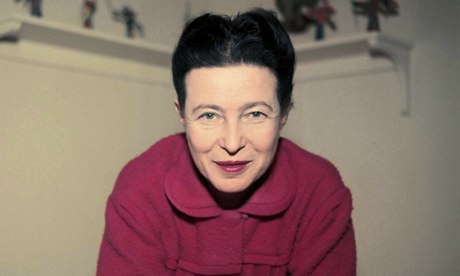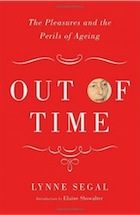珍芳達
只有你可以決定,你擁有什麼樣的老年! 文/吳怡靜(天下雜誌2011-08)
五月中旬,法國坎城影展登場,只見紅毯上星光燦爛,年輕女星們爭奇鬥豔。 誰能想到,搶走媒體青睞,讓鎂光燈閃個不停的,竟是一位高齡已經七十三歲的美國阿嬤。
穿著一襲 Emilio Pucci 白色貼身長禮服,珍芳達看起來優雅又性感,看不出她已年過七旬。媒體一片讚嘆,都想問她,「妳的祕訣是什麼?」
對這位拿過兩屆奧斯卡影后的老牌女星來說,不老的祕訣除了靠運動、飲食、愛情,甚至整型外,更需要改變看待老化的態度──老年不再是黃昏,而是人生中的「黃金時段」。
「現代人愈來愈長壽,多出來的這一大段人生,你要怎麼過?為什麼不好好利用呢?」她質問。 八○年代,珍芳達的有氧舞蹈錄影帶,掀起了全球健身熱潮;三十年後,她以新書《黃金年華Prime Time》鼓勵大批陸續退休的嬰兒潮世代,活出更精彩、更健康、更快樂的老年時光。
以下﹐珍芳達的自述
「 我從來沒料到,自己可以活得這麼久,而且愈活愈快樂。是只有我這樣,還是很多人老了也如此?為什麼沒有人把老年,當成人生中的「黃金時段」?因為有這些疑問,才有了這本書。
我找了很多資料,有個針對三十五萬名美國人所做的大型研究發現,多數人在五十歲以後,通常會比過去更快樂。他們會變得比較沒有敵意、比較不焦慮或緊張。 原因何在?科學家也無法解釋。
但他們提出了一些滿合理的推論,例如,不論你是男人或女人、結了婚或單身、富有或貧窮,隨著年紀增長,你的人生通常漸入佳境,至少大部份的人是如此。 五十歲後,人生漸入佳境因為你已經是過來人,看過、走過、做過的人生經驗很多;你知道哪些危險不要再碰、哪些錯誤不要再犯、哪些東西你不需要、哪些事情你 應該放手,或者釋懷。
以我自己為例。多年來,我深受憂鬱症所苦,而且我父母親也都有憂鬱症。我常每天早上一醒來,就被許多負面的情緒淹沒。直到四十幾歲後,我發現,這些想法未必都是真的,才慢慢學會不再陷入灰暗的思考。
我在寫書時,訪問了很多人,他們也許體力大不如前,被病痛折磨,卻多半都很樂觀。因為他們的生命隨著歲月而成長,增加了智慧、覺悟、心靈上的自在等。所以,並不只有我是這樣,科學研究也證明,你可以愈老愈快樂。
弧形人生vs.階梯人生! 這本書裡,我提到了看待生命老化的兩種方法,這是已故的哈佛教授艾恩海姆所提出的兩種意象,第一種是傳統的、生物觀點的弧形(arch)模式:生命從你呱呱落地開始,在中壯年達到高峰,然後走向衰老。
但還有一種爬階梯(staircase)模式,也就是讓自己的生命一步一步往前發展,向更高的境界邁進。 我們的文化一向著迷於青春,所以大家只看到弧形的模式,老化被視為肉體的衰亡。
而階梯模式卻可以讓人在老年時,即使視茫髮蒼,也有機會再造巔峰。
最近,我剛演了一齣跟貝多芬有關的舞台劇。你知道嗎,他就是在晚年寫出了最好的作品。
畫家莫內是另一個例子。他老年時得了黃斑部病變,卻在幾乎全盲的狀態下,完成了他最好的畫作。
身體的退化會讓你變得遲緩,但這種遲緩反而使你有了不同的領悟,就像莫內的印象派繪畫所捕捉的。你會看到事物的本質,而不是那些細微的差異。 所以,我認為我們應該用爬階梯的方式,看待生命的老化。
現代人愈來愈長壽,這一代美國人的平均壽命,比他們的祖父母、曾祖父母多了三十四年。多出來的這一大段人生,你要怎麼過?為什麼不好好利用呢? 寫這本書,就是希望提供一些建議,讓大家在老年活得更精彩。舉例來說,持續運動,保持身體的活力,對老年人太重要了。
我看了很多研究才曉得,老化對身體造成的改變原來這麼大。 包括肌肉流失、骨頭變細、腦部縮小(特別是掌管計劃、思考能力的額葉皮質),以及血管硬化等。而只要你經常運動,就能減緩這些改變。
我一輩子都在運動,但現在已經不是為了怕胖要變瘦,而是為了維持身體的活動功能:有能力拿行李、抱孫子、在倒車時轉頭往後看。所以,我必須運動來維持身體 的彈性和平衡,還要設法留住一定的肌肉量。 由於我的臀部和膝蓋都動過手術,我現在不能跑,也不能做有衝擊性的運動,身體逼著我要慢下來。 做慢一點的運動也很好,會讓我感覺很優雅。
平常,我固定會做心肺功能訓練、舉重或阻力訓練,還有平衡訓練。 飲食也很重要。
我努力讓自己吃得健康,而且年紀愈大,愈要降低熱量的攝取,避免吃下那些只有熱量,沒有營養價值的空卡路里。
另外,自從拍了高達的《一切安好》,我有將近四十年沒用法語拍電影。但去年,我又去巴黎拍了一部法國片,部份原因,是為了鍛鍊我的腦力。
如果你已經有了固定的消遣活動,例如玩填字遊戲、縫拼布等,那當然很好。可是,老年人要保持頭腦靈活健康,最好的方法,就是去學新東西,例如學習新的語言、玩新的樂器等。 鍛鍊腦力,去學新東西吧!
我最近才開始學打網球,原本還要去學太極拳,但前陣子看了一齣百老匯音樂劇,深受吸引,現在決定改學踢躂舞。
三十年前,我跟父親(註:亨利方達)一起拍了《金池塘》,當時他已經重病纏身,拍完不久就過世。
看著他衰老而死,我突然領悟,真正讓我害怕的,不是死亡,而是帶著各種「想做卻來不及做」的遺憾,走向人生的終點。為什麼我這個沒做、那個沒做? 為什麼我沒有告訴她我很愛她?從那時起,我心裡面逐漸清楚,要如何度過自己的晚年:我希望我的晚年過得精彩,死去的時候,沒有太多的遺憾。
拍《金池塘》的時候,我跟凱薩琳赫本建立了非常深厚的友誼。老年學專家指出,想讓自己老得健康快樂,有個重要條件,就是要具備所謂的「代際關懷」(generativity hc按: hc按:一般指有生產能力、有活力、生生不息的;此處指老年人要用照顧年輕一代,以豐富自己的人生最後一慕,第三幕---60歲起......)。
這是知名心理學家艾瑞克森發明的術語,意思是發揮做為長輩的角色,照顧並關心下一代的成長。研究已經證明,具備這種關懷的人,往往老得比較健康。 而對我來說,當年的凱薩琳赫本就是一個關懷後進的長輩,對我特別照顧,更傳給我許多人生智慧。
例如,她每天都會寫日記,而且她告訴我,裡頭寫最多的,就是她的失敗,「我發現,一個人從失敗與痛苦中學到的,遠比成功所給的還要多。」 我完全同意,因為我自己就是在人生的每個痛苦時刻,找到成長的機會。
我結過三次婚,後來都以離婚收場,這是我人生中最大的挫折,尤其是後兩次離婚,讓我痛苦萬分,接近崩潰。 後來我告訴自己,不要忙亂,靜下來,好好想一想,應該從這些挫折和痛苦中,學到什麼。慢慢地,我才開始找出新的自我意識!

Listen
Prime Time: Love, health, sex, fitness, friendship, spirit; Making the most of all of your life
- Paperback: 448 pages
- Publisher: Random House Trade Paperbacks; 1 edition (May 22, 2012)
A Letter from Jane Fonda
In my memoir, My Life So Far, I defined my life in three acts: Act I, from birth to 29 years; Act II, from 30 to 59 years; and Act III, from 60 until the end. It really seemed to resonate with people, and a few years after the book came out, my editor at Random House, Kate Medina, came to me and suggested I write a book focusing more on the Third Act. I was interested in doing this because I was already well into my Third Act and relished the challenge to dig deeper, to understand its meaning, to learn how to make the most of it, and to navigate the inevitable challenges of aging--what is negotiable and what isn't.
Third Acts are important. They can make sense out of what may seem like discordant, confusing First Acts. Third Acts can, if we think about it, allow us to discover who we really are. Entered with intention, Third Acts can help us become midwives to ourselves before we die.
I knew that this exploration is especially important now, because in the last century, the average life expectancy has expanded by 35 years! Think about it: At the time of our founding fathers, the average person died at around 35 years of age. Now we can expect to live, on average, 80 years! An entire second adult lifetime! This amazing gift of time means that Third Acts have gained a whole new significance.
Yet we are pioneers within this new reality. We need a road map to show us how to navigate the new terrain. I wanted to create this roadmap--for myself, as well as for my readers. We who are approaching our Third Acts (or are already in the midst of them, as I am), can show the way for those coming up--our children, grandchildren, nieces, and nephews.
We are still living with the old paradigm of aging, which can best be described as an arch: We are born, we peak at midlife, and then decline--age as pathology.
While researching my book, I discovered another paradigm, one that is far more appropriate given the longevity revolution. It is the image of a staircase, an upward ascension until the end--age as potential--for wisdom, authenticity, and wholeness.
This metaphor for aging is one that I myself am experiencing, and I wanted to understand why this is so and write about it. Yes, my body is experiencing the effects of age, but after coming through a very difficult, painful midlife, I find that I am happier, more peaceful, and more content than I have ever been. My relationships are deeper and less anxious. I find this is true, by the way, for most of my older friends. This was not at all what I had expected at this stage of life! Yes, we forget things, but we also remember a lot and with more vividness now because we know why we want to remember them. Yes, we lose eyesight, but we gain insight. We learn what we need and what to let go of. We tend to make lemons into lemonade instead of mountains out of molehills. Scientists call this the Positivity Factor and their research shows it to be the case for most women and men over 50, regardless of their circumstances, even in the face of physical challenges. How, I wanted to know, can we ensure this is true for us?
I sat myself down and made a list of all the things I wanted to know about aging, from sex to exercise; from nutrition to wisdom. A to Z. I talked to scientists, doctors, priests. To centenarians. To men and women in long-term marriages, and those who were looking for love or needing a way out of loneliness. I write about my own experiences and much more.
I realized that to better navigate our Third Act, we benefit by reviewing the first two acts. I call this doing a Life Review, and it can profoundly alter our understanding of ourselves, our past, and what we need to do to complete ourselves as we ascend the staircase to the end. This is why Prime Time includes a discussion of Acts I and II and the developmental issues that lie within each of them, as well as questions you can ask yourself about how you were at those times. Understanding these things can help you swing into your Third Act as prepared as possible to make it your Prime Time.
--This text refers to an out of print or unavailable edition of this title.






